Travel Through Mozambique on a Harley-Davidson
By Peter & Kay Forwood
Mozambique on a Harley (22/9/00 - 30/9/00)
Distance 1495 km (199655 km to 201150 km)
This is part of the Seventh section of our around the
world trip.
Complete Trip Overview & Map
Coming from South Africa or read our previous
visit to Mozambique
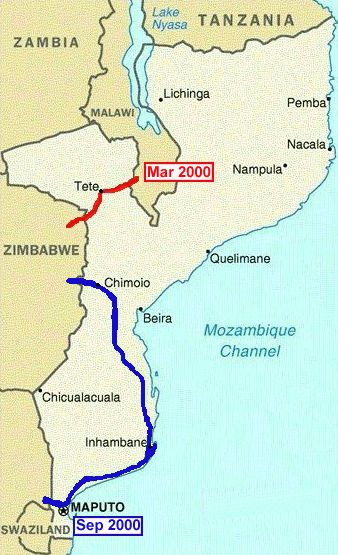 22/9/00 Border crossing easy but payment of $US 2.00 each
for immigration documents and the same for vehicle document process. An
immediate change in the black populations attitude towards us "whites" as
travellers. The effects of the apartheid era still fresh in the way South
Africa's white and black populations treat each other. Other Africans not
having been through the same history are more open, genuine and friendly
towards us.
22/9/00 Border crossing easy but payment of $US 2.00 each
for immigration documents and the same for vehicle document process. An
immediate change in the black populations attitude towards us "whites" as
travellers. The effects of the apartheid era still fresh in the way South
Africa's white and black populations treat each other. Other Africans not
having been through the same history are more open, genuine and friendly
towards us.
23/9/00 In travelling you only meet people for a very short
period of time and whilst it is easy for us as the motorcycle is an obvious
talk point, for a backpacker (unless he/she is good looking) they run the
risk of travelling the world in oblivion to other travellers. Some people
turn local, taking on India's ashramy's ways, others grow dread locks, some
carry a guitar but the Australian whom we met this morning carries a didgeridoo.
We have seen this before but they usually don't know how to play it properly.
At 8.00 am to connect at breakfast out of the leg of an old pair of jeans
came a well worn didgeridoo which almost talked on its own, its owner having
used it to connect, particularly with locals, in 58 countries over the last
12 years of world travel. And as you can imagine quite a character in himself.
Wandered the streets of Maputo admiring the old Portuguese architecture,
appalled at the communist style concrete housing blocks and the degeneration
of the city's roads and sewerage services.
24/9/00 450 km north to Tofu, over the Limpopo River, the
scene of the devastating floods earlier this year. The road is good but the
bridge building goes on. A couple of minor detours and a bailey bridge the
only uncompleted roadwork's. Every grass hut along its shores rebuilt, not
six months old, the concrete shops of Xai-Xai still empty and the plastic
aid agency tents still resettling the homeless. The highly fertile river
flats that bring life also take it away. Clocked over 200,000 km on the odometer
today, with the obligatory photo.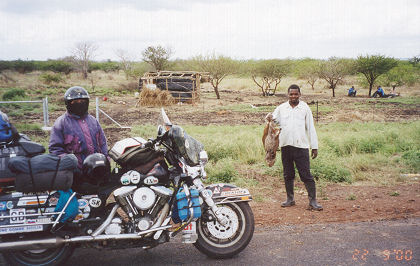
25/9/00 Woke this morning to a blood filled mosquito inside
our tent. Due to the length of time we are travelling we are not taking any
anti malarial medication. Since the floods Mozambique has had an enormous
increase in malarial cases. With or without medication the worry is always
there. A quarter of all children in Africa die before they reach 5 years
old due to malaria. If they don't die a semi resistance seems to be obtained.
I am sure we will get more mosquito bites. Perhaps they won't be carrying
malaria. Met up with a Norwegian couple and their son travelling on motorcycles,
one with a sidecar, for four months in Southern Africa. Moving slowly they
are holiday/travelling. The MZ with chair was imported from Norway and the
Yamaha XT600 bought locally after their previous purchase only lasted 500
km. Surfed all day at the lovely beach.
26/9/00 Where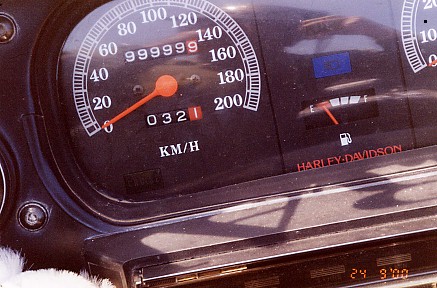 are you from? Australia, blank reaction. You know the
Olympics, blank look. Despite Mozambique having just won its first gold
medal ever at an Olympics the people in the rural areas have not heard of
them or Australia. It's not surprising as most westerners don't know where
Mozambique is either. And while we in the west complain about higher fuel
prices for petrol, the price here is dearer than in Australia and about two
thirds that of Europe, in a country where incomes are one or two dollars a
day. 350 km to Vilanculo, detouring around washed out bridges and over corrugated
asphalt. To move off the bitumen is to head into deep sand. The whole of
this part of the country seems rock free, built on sand. Passed land mine
clearing teams, a remnant of the almost 20 years of civil war. They were
working less than ten meters from the main road pegging out small sections
and meticulously combing the ground. If you need to go to the toilet, don't
step off the road edge too far.
are you from? Australia, blank reaction. You know the
Olympics, blank look. Despite Mozambique having just won its first gold
medal ever at an Olympics the people in the rural areas have not heard of
them or Australia. It's not surprising as most westerners don't know where
Mozambique is either. And while we in the west complain about higher fuel
prices for petrol, the price here is dearer than in Australia and about two
thirds that of Europe, in a country where incomes are one or two dollars a
day. 350 km to Vilanculo, detouring around washed out bridges and over corrugated
asphalt. To move off the bitumen is to head into deep sand. The whole of
this part of the country seems rock free, built on sand. Passed land mine
clearing teams, a remnant of the almost 20 years of civil war. They were
working less than ten meters from the main road pegging out small sections
and meticulously combing the ground. If you need to go to the toilet, don't
step off the road edge too far.
27/9/00 We are slowly getting back to the relaxed pace
of life in Africa. Watching the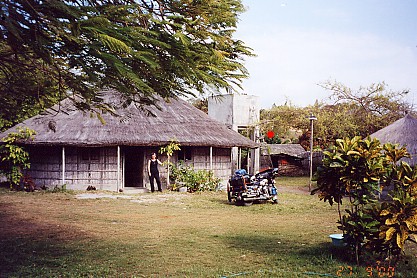 women gathering, waiting for the tide to recede, with
their spears of three prongs of sharpened steel attached with bark strips
to the wooden fishing pole. When the tide was right enmasse they moved onto
the still shallow flooded sand bars that stretch almost to the offshore islands
and shuffling with their feet they locate crabs beneath a covering of sand
to spear. Young boys gathered clams. We Bought some, boiling them fresh and
ate them with with rice for lunch. Vilanculo is a place, rare, that tourism
has provided moderate facilities where you can watch the locals live a lifestyle
they have done for generations.
women gathering, waiting for the tide to recede, with
their spears of three prongs of sharpened steel attached with bark strips
to the wooden fishing pole. When the tide was right enmasse they moved onto
the still shallow flooded sand bars that stretch almost to the offshore islands
and shuffling with their feet they locate crabs beneath a covering of sand
to spear. Young boys gathered clams. We Bought some, boiling them fresh and
ate them with with rice for lunch. Vilanculo is a place, rare, that tourism
has provided moderate facilities where you can watch the locals live a lifestyle
they have done for generations.
28/9/00 Africans speak loudly, usually at the top of their
voices. This can be annoying particularly when you want to watch the world
go by quietly in a peaceful setting. It is better understood, when explained,
that only by speaking loudly so that everyone can hear, are you free of accusations
of spreading rumours or gossip. We hired a dhow (small single sailed boat
almost the same as the Middle East's feluca) to get out amongst the fishing
boats. With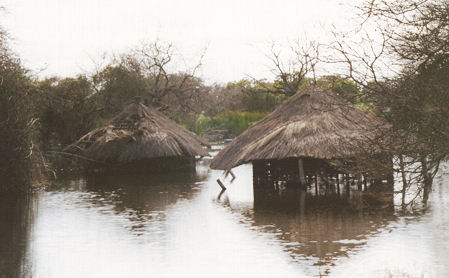 large tides the fishermen net the deep channels between sand bars at low
water, laying out and drawing in the nets by hand.
large tides the fishermen net the deep channels between sand bars at low
water, laying out and drawing in the nets by hand.
29/9/00 450 km to Chimoio, mostly good roads, except where
the flood plains soaked the road base so the asphalt crumbled to pot holes.
Here there are still stagnant waters left over from the floods last March.
Trees with their roots lying in water too long are dead and village huts,
long ago abandoned, still partially submerged. The cost of everything in
Africa continues to astound me for such a poor continent. Except for South
Africa the continent produces nothing but raw materials. There is no transport
system to move produce around the countries and as such the people only produce
the basics of what they need. Any manufactured product has to be imported
and is as expensive as in western countries. The next rung up from survival
level seems unobtainable, yet the land is totally under utilized by western
standards.
Move with us to Zimbabwe
 22/9/00 Border crossing easy but payment of $US 2.00 each
for immigration documents and the same for vehicle document process. An
immediate change in the black populations attitude towards us "whites" as
travellers. The effects of the apartheid era still fresh in the way South
Africa's white and black populations treat each other. Other Africans not
having been through the same history are more open, genuine and friendly
towards us.
22/9/00 Border crossing easy but payment of $US 2.00 each
for immigration documents and the same for vehicle document process. An
immediate change in the black populations attitude towards us "whites" as
travellers. The effects of the apartheid era still fresh in the way South
Africa's white and black populations treat each other. Other Africans not
having been through the same history are more open, genuine and friendly
towards us. 
 are you from? Australia, blank reaction. You know the
Olympics, blank look. Despite Mozambique having just won its first gold
medal ever at an Olympics the people in the rural areas have not heard of
them or Australia. It's not surprising as most westerners don't know where
Mozambique is either. And while we in the west complain about higher fuel
prices for petrol, the price here is dearer than in Australia and about two
thirds that of Europe, in a country where incomes are one or two dollars a
day. 350 km to Vilanculo, detouring around washed out bridges and over corrugated
asphalt. To move off the bitumen is to head into deep sand. The whole of
this part of the country seems rock free, built on sand. Passed land mine
clearing teams, a remnant of the almost 20 years of civil war. They were
working less than ten meters from the main road pegging out small sections
and meticulously combing the ground. If you need to go to the toilet, don't
step off the road edge too far.
are you from? Australia, blank reaction. You know the
Olympics, blank look. Despite Mozambique having just won its first gold
medal ever at an Olympics the people in the rural areas have not heard of
them or Australia. It's not surprising as most westerners don't know where
Mozambique is either. And while we in the west complain about higher fuel
prices for petrol, the price here is dearer than in Australia and about two
thirds that of Europe, in a country where incomes are one or two dollars a
day. 350 km to Vilanculo, detouring around washed out bridges and over corrugated
asphalt. To move off the bitumen is to head into deep sand. The whole of
this part of the country seems rock free, built on sand. Passed land mine
clearing teams, a remnant of the almost 20 years of civil war. They were
working less than ten meters from the main road pegging out small sections
and meticulously combing the ground. If you need to go to the toilet, don't
step off the road edge too far.  women gathering, waiting for the tide to recede, with
their spears of three prongs of sharpened steel attached with bark strips
to the wooden fishing pole. When the tide was right enmasse they moved onto
the still shallow flooded sand bars that stretch almost to the offshore islands
and shuffling with their feet they locate crabs beneath a covering of sand
to spear. Young boys gathered clams. We Bought some, boiling them fresh and
ate them with with rice for lunch. Vilanculo is a place, rare, that tourism
has provided moderate facilities where you can watch the locals live a lifestyle
they have done for generations.
women gathering, waiting for the tide to recede, with
their spears of three prongs of sharpened steel attached with bark strips
to the wooden fishing pole. When the tide was right enmasse they moved onto
the still shallow flooded sand bars that stretch almost to the offshore islands
and shuffling with their feet they locate crabs beneath a covering of sand
to spear. Young boys gathered clams. We Bought some, boiling them fresh and
ate them with with rice for lunch. Vilanculo is a place, rare, that tourism
has provided moderate facilities where you can watch the locals live a lifestyle
they have done for generations.  large tides the fishermen net the deep channels between sand bars at low
water, laying out and drawing in the nets by hand.
large tides the fishermen net the deep channels between sand bars at low
water, laying out and drawing in the nets by hand.